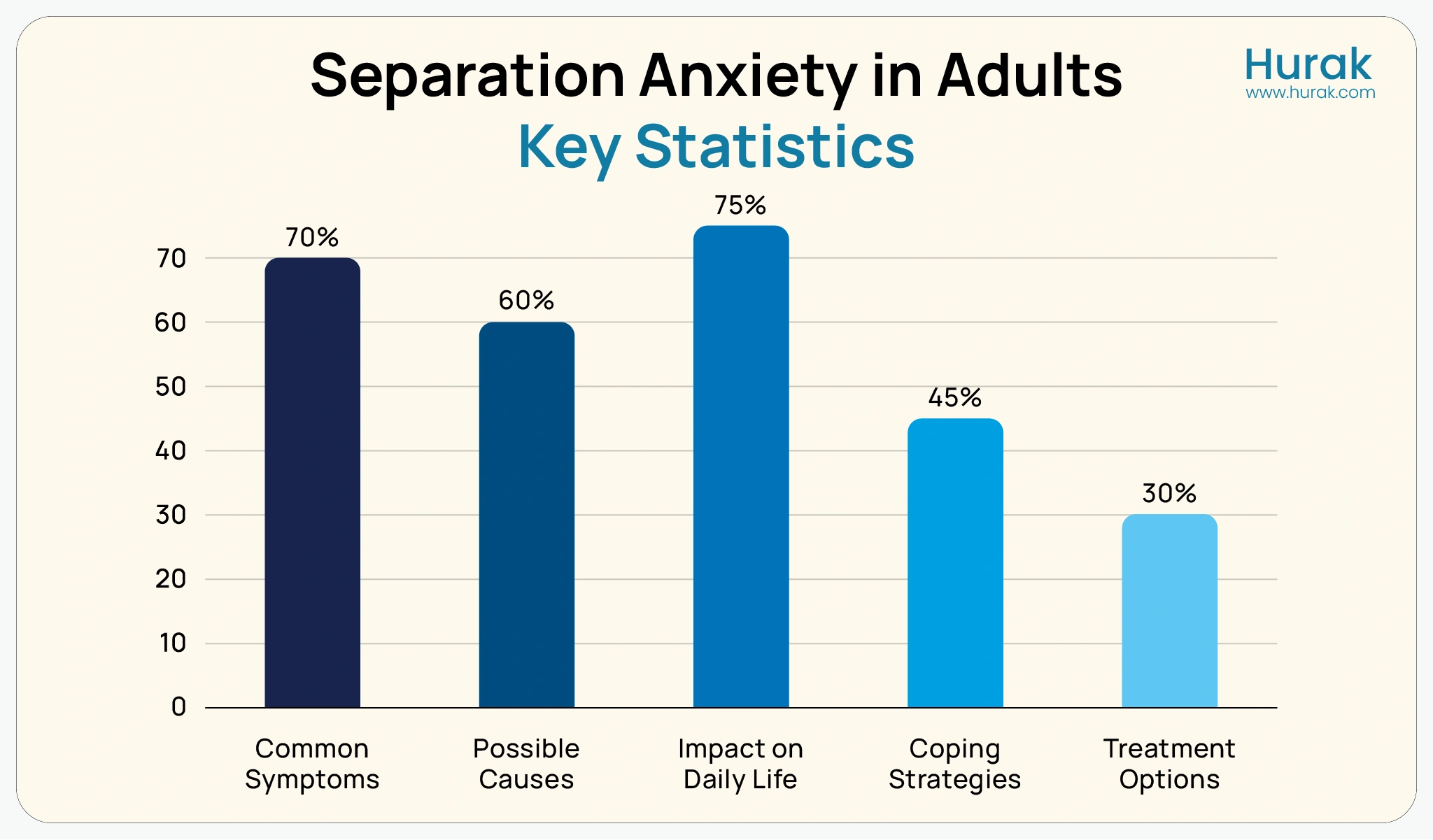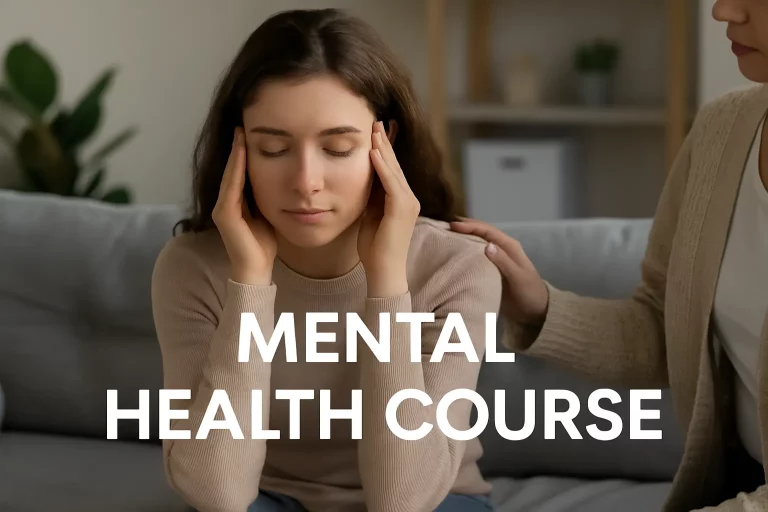If you feel overwhelming anxiety at the thought of being away from someone important to you, you’re not alone. Separation anxiety in adults is more common than many people realize and can lead to significant emotional and practical challenges. While it’s often associated with childhood, adults can also experience persistent fear and distress when separated from loved ones or familiar places.
Adult separation anxiety disorder can interfere with relationships, work, and overall mental health. In this article, we’ll explore what causes separation anxiety in adults, the symptoms you should look out for, and evidence-based strategies you can use to manage and overcome it.

What is Separation Anxiety in Adults?
Separation anxiety in adults is a recognized mental health condition marked by intense fear and distress when being away from people you feel strongly attached to, such as a partner, family member, or close friend. Unlike ordinary feelings of missing someone, this anxiety is overwhelming and persistent, often leading to panic, physical symptoms like nausea or headaches, and avoidance of situations that involve separation.
Adults with separation anxiety may constantly worry that something bad will happen to their loved ones or themselves when apart, which can disrupt daily routines, work, and relationships. While it can feel isolating, separation anxiety is treatable, and with the right support and coping strategies, it’s possible to regain confidence and feel secure again.
The following chart presents key statistics on separation anxiety among adults, highlighting the prevalence of symptoms, their causes, and the effects, as well as the measures individuals use to manage this condition.

What Causes Separation Anxiety in Adults?
Separation anxiety in adulthood can develop for many reasons, often involving a mix of past experiences, major life changes, and underlying mental health conditions. The table below outlines some of the most common factors that can contribute to this condition:
Cause | Description |
Childhood Experiences | Begins in childhood and persists if early attachments were insecure or disrupted. |
Major Life Changes | Events like the death of a loved one, divorce, or moving to a new place can trigger anxiety later. |
Traumatic Experiences | Past trauma, neglect, or sudden loss can increase fear of separation. |
Chronic Stress | Ongoing stress makes people feel more vulnerable and heightens anxiety about being apart. |
Mental Health Conditions | Anxiety disorders, depression, and PTSD can contribute to or worsen separation anxiety. |
Personality & Attachment | Anxious attachment styles and certain personality traits raise the risk of developing symptoms. |
Separation anxiety in adults often stems from childhood experiences, trauma, or major life changes. It can cause intense fear and make daily life feel unmanageable.
Our Mental Health First Aid Courses give you practical tools to understand and respond to issues like separation anxiety with confidence and care.
Enrol in our Mental Health First Aid Course,
What are the Symptoms of Separation Anxiety?
Separation anxiety in adults shows up in many ways, causing severe distress about being apart from loved ones or familiar places. People may feel constant worry that something bad will happen, avoid spending time alone, or need to check in frequently for reassurance. Physical symptoms, such as nausea, headaches, and trouble sleeping, are also common. These feelings can make daily life feel exhausting and difficult to manage.
Emotional Symptoms
- Intense fear or distress when anticipating or experiencing separation
- Persistent worry that something bad will happen to loved ones (accidents, illness, loss)
- Excessive need to stay in contact or get reassurance
Behavioural Symptoms
- Avoiding being alone or away from attachment figures
- Reluctance or refusal to travel, leave home, or spend time apart
- Difficulty sleeping without the person nearby
- Frequent checking in (calls, texts, visits)
Physical Symptoms
- Nausea or stomach aches when separated
- Headaches or dizziness
- Rapid heartbeat or shortness of breath
- Trouble sleeping
Cognitive Symptoms
- Intrusive thoughts about losing the person
- Difficulty concentrating due to worry
- Catastrophic thinking (expecting the worst to happen)
How to Deal with Separation Anxiety in Adults?
Dealing with separation anxiety as an adult can feel overwhelming, but there are steps you can take to feel more secure. Start by learning about the condition so you can understand your feelings better. Gradually practice spending time apart from loved ones to build confidence. Relaxation techniques like deep breathing or meditation can ease anxiety, while limiting constant check-ins helps you become more independent. Talking to a therapist or joining a support group can also make a big difference.
Learn About Separation Anxiety
- Read credible articles or books to understand what separation anxiety is and why it happens.
Knowing it’s a recognized condition can help you feel less alone and more empowered.
Practice Gradual Exposure
- Start by spending short periods apart from loved ones and gradually increase the time.
- Try leaving the house alone for a brief walk or running a quick errand.
- Celebrate small successes to build confidence
Develop Coping Skills
- Use deep breathing exercises or mindfulness meditation to calm your body when anxiety rises.
Keep grounding tools handy, like a calming playlist or a stress ball.
Challenge Unhelpful Thoughts
- Notice catastrophic thinking, such as “Something terrible will happen if I’m not there.”
Replace these thoughts with more balanced statements: “I can handle this, and my loved ones are safe.”
Limit Reassurance-Seeking
- Reduce frequent calls, texts, or check-ins gradually to build independence.
Set specific times to check in rather than reaching out impulsively.
Establish a Support System
- Share your experiences with trusted friends or family members who can encourage you.
- Join a support group for people experiencing similar challenges.
Create a Routine
- Having a predictable schedule can lower stress and make separations feel less disruptive.
Include relaxing activities in your routine, like exercise, reading, or hobbies.
Focus on Self-Care
- Get enough sleep, eat balanced meals, and engage in regular exercise.
Taking care of your body helps regulate anxiety
Seek Professional Help
A therapist trained in Cognitive Behavioral Therapy (CBT) can teach effective techniques to reduce symptoms.
If anxiety is severe, consider speaking to a psychiatrist about medication options and if your separation includes legal or marital challenges, consider speaking with a divorce lawyer for support on that front.
Be Patient With Yourself
Healing takes time. Recognize that setbacks are part of the process, and small steps add up over time.
Conclusion
Separation anxiety in adults can be a challenging and often misunderstood experience, but it’s important to remember that you are not alone and that help is available. By understanding the causes and symptoms, practicing healthy coping strategies, and reaching out for professional support when you need it, you can take meaningful steps toward feeling more secure and independent. Healing doesn’t happen overnight, but with time, patience, and the right tools, it is possible to overcome separation anxiety and build a more fulfilling life. Whether you’re working with a therapist, leaning on trusted relationships, or exploring self-care practices, know that lasting improvement is within reach, and you deserve compassion and support along the way.
FAQs
What triggers separation anxiety in adults?
Separation anxiety can be triggered by stressful life events, such as losing a loved one, going through a breakup or divorce, moving away, or experiencing trauma. For some, it may also resurface during major transitions like parenthood or caregiving.
How do you know if you have separation anxiety as an adult?
Signs include excessive fear or distress when away from loved ones, persistent worry that something bad will happen, avoiding being alone, and physical symptoms like headaches, nausea, or trouble sleeping when separated.
Can separation anxiety in adults be cured?
While everyone’s experience is different, separation anxiety is treatable. With therapy, self-help strategies, and sometimes medication, many people see significant improvement and learn to feel more secure.
What is the best treatment for separation anxiety in adults?
Cognitive Behavioral Therapy (CBT) is often considered the most effective treatment. Gradual exposure to being alone, learning relaxation techniques, and challenging unhelpful thoughts can also help. In some cases, medication may be recommended.
Is separation anxiety a form of an anxiety disorder?
Yes, separation anxiety disorder is officially recognized as an anxiety disorder. It involves excessive fear about being separated from people you’re attached to and can affect daily life and relationship
Explore Our First Aid Courses:
Emergency First Aid at Work
A practical, short-duration course tailored for low-risk workplaces. This training equips participants with the essential skills and confidence to handle medical emergencies effectively.
First Aid at Work
A comprehensive, Ofqual-regulated Level 3 qualification delivered over three days in a classroom setting. Ideal for designated first aiders in higher-risk environments such as construction sites, warehouses, and manufacturing facilities.
Paediatric First Aid
A two-day, Ofqual-regulated course dedicated to first aid for infants (0–1 year) and children up to puberty. Perfect for childcare professionals, teachers, and parents who want to be prepared for emergencies involving young children.
Basic First Aid Course
An introductory, self-paced course designed for anyone seeking a general understanding of first aid or a quick annual refresher to keep skills up to date.
Advanced First Aid Course
A fully online, self-paced Level 3 program that provides in-depth training for those who want to build advanced first aid knowledge and capabilities beyond the basics.





